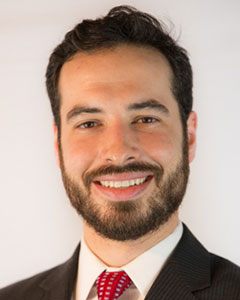Dr. Davis Rogers – Alumnus Spotlight

Orthopaedic Surgery Resident, Johns Hopkins University School of Medicine
Hometown: Jackson, MS
BA in Physics, minors in Chemistry and Physics (2015)
When I enrolled at Ole Miss, I started a pre-med track with the intention of pursuing a medical education. Initially, I chose to major in physics simply due to an inherent interest in the subject, without fully comprehending its relationship to the practice of medicine. As I continued my undergraduate tenure, this relationship was highlighted in specific courses built into the physics curriculum.
At its core, physics is an applied science; studying this field requires the understanding of intricate systems and how that can be used to develop practical applications for our lives. In the junior level physics courses, developing a foundation of mechanics, fluid dynamics, and forces applied in a system becomes paramount in understanding the physiology of the human body. Variations in blood pressure due to systemic alterations in vascular resistance and blood flow, evolutionary mechanisms to improve leverage and torque in the musculoskeletal system, and interpreting currents in electrophysiology of the nervous system are just a few examples of physics principles that will be required during the completion of a medical education.
After graduation, I went on to attend medical school at the Johns Hopkins University School of Medicine in Baltimore, MD. I graduated medical school in 2019 and have continued my stay in Baltimore as a resident training in Orthopaedic surgery since then.
Reflecting on these principles as I pursue my training in orthopaedics, even the basic concepts of physics are utilized on a daily basis. As orthopaedic surgeons, we work in conjunction with diagnostic radiologists to read and interpret our own imaging. This includes advanced imaging modalities such CT, MRI, bone scans, and others. Understanding how certain tissues and molecules appear under varying sequences of an MRI, for an example, is vital to interpreting a patient’s pathology and, subsequently, their treatment options.
Having a background in physics provides an advantage in the application of this technology. When we are tasked with fixing complex fractures, our approach truly revolves around analyzing the force vectors applied across an anatomic location. Preoperative planning includes deciding between compression or tension for our fixation device’s primary mode of support, identifying which material can withstand the distraction forces of body weight and nearby muscle tension, and even comprehending whether our surgical fixation method will provide the correct stability to allow for primary versus secondary bone healing. This also becomes inherent in the development of biomaterials, as our field is in continual search for materials that enhance healing such as matching the modulus of elasticity of bone, or materials that limit galvanic corrosion or shearing forces in order to increase longevity in the body.
Why study physics at UM?
The Department of Physics at the University of Mississippi supported my colleagues and I to pursue a variety of research projects in line with our interests. My thesis project centered around building a physical model of ultrasonic transducers in an effort to better understand how ultrasonic fields behave in certain materials. Now, similar ultrasonic transducers are used regularly in our clinical setting, whether that be through radiation-free diagnostic imaging for developmental dysplasia of the hip in our pediatric population, or even using low-intensity pulsed ultrasound (LIPUS) to improve bony healing at the site of fractures. Although neither I nor my thesis advisor, Dr. Mobley, predicted if and how I might use ultrasound in my professional life, the support I received by him and the associated professors allowed me the opportunity to gain hands-on knowledge in a specific area that now directly impacts patient care.
During my final year in medical school, I served on the Admissions Council to help interview and select the candidates for admission into the Johns Hopkins School of Medicine. I can directly attest that candidates with a background in physics were always highly regarded, as it generally implies a difficult undergraduate course load, a dedication to scientific principles, and a degree of analytical approach to problems that correlates well with the diagnostic approach to patients. Although any major/background can support you in the journey towards medical school, I firmly believe that the educational approach and principles taught through the physics curriculum at the University of Mississippi lends itself to outstanding candidates for the field of medicine and others. I know that personal anecdotes from other students will echo this sentiment.